In this article series, we have already covered [TOP OS SKILLS] [Top IT SKILLS] and [TOP DEVELOPERS SKILLS].
This is the fourth article of the series, which aims at making you aware of ‘Top Network Protocol Skills in demand’. It is important to note that the skill set keeps on changing as per the demand of the market and requirements. We will try to keep you updated, if there is any major changes in the below statistics.
One skill will not bring you a job. You must have balanced skill sets to be successful.
1. DNS
DNS stands for Domain Name System. DNS is application protocol used for naming of computer, services and resource connected to Network or Internet. DNS skills are in high demand and it stands at the top of the list. It has shown a growth in demand upto 12% in the last quarter.
2. HTTP(S)
Hypertext Transfer Protocol aka HTTP is one of the most widely used application protocol. HTTP lies at the heart of World Wide Web (www). HTTPS is a communication Protocol for Secure connection commonly used by banking sectors and other financial companies. It has shown a growth in demand by nearly 16% in the last quarter. It stands rock solid at position number two.
3. VPN
VPN stands for Virtual Private Network. VPN makes it possible to extend private network across public network. VPN made to the list at position number three. It has shown a growth in demand by 19% in the last quarter.
4.DHCP
DHCP stands for Dynamic Host Configuration Protocol. This is a Network Protocol which stands tall at fourth position. It has shown Nearly 2% growth in demand in the last quarter.
5. NFS
NFS stands for Network file system Protocol. It was developed by Sun Microsystem. NFS allows user to access files over network as if they are available locally. It comes at fifth position. NFS has shown a growth in demand which is nearly 32% in the last quarter.
6. SNMP
SNMP stands for Simple Network Management Protocol. It is primarily responsible for managing devices on IP network. SNMP made to the list for position number sixth and has shown a growth in demand of nearly 34% in the last quarter.
7. SMTP
SMTP stands for Simple Mail Transfer Protocol which is used primarily in electronic mail transmission. It comes seventh in the list. SMTP has shown a growth in demand upto 20% in the last quarter.
8. VOIP
VOIP stands for Voice over Internet Protocol. It is responsible for voice and multimedia over Internet Protocol. VOIP stands at position number eight and has shown a decline of nearly 14% in demand in the last quarter.
9. SSH
SSH stands for Secure shell. It allows encrypted session to shell. SSH stands at number nine in the list and has shown a growth in demand of 6% in the last quarter.
10. FTP
FTP stands for File Transfer Protocol. It is used for transferring files over network. FTP stands high at position number ten. It has shown a decline of nearly 15% in the last quarter.
| 1 | DNS | 12% + |
| 2 | HTTP(S) | 16% + |
| 3 | VPN | 19% + |
| 4 | DHCP | 2% + |
| 5 | NFS | 32% + |
| 6 | SNMP | 34% + |
| 7 | SMTP | 20% + |
| 8 | VOIP | 14% – |
| 9 | SSH | 6% + |
| 10 | FTP | 15% – |
That’s all for now. I’ll be coming up with the lst article of this series very soon. Till then stay tuned and connected to Tecmint. Provide us with your valuable feedback in the comments below. Like and share us and help us get spread.






